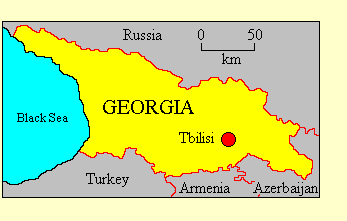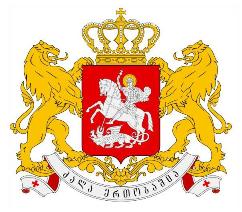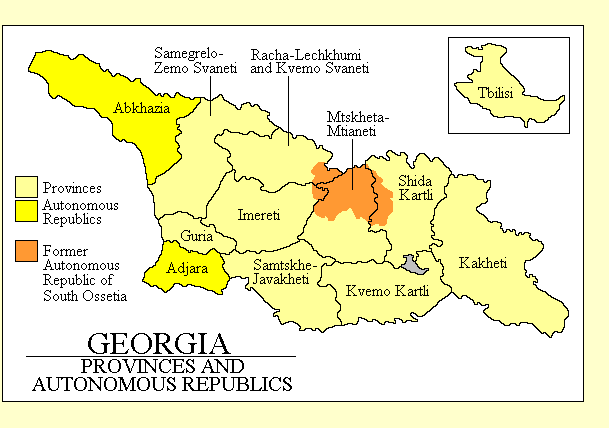

GEORGIA
• Official name: Sak'art'velo (Georgia) (The English "Georgia" is derived from Gurj, the Persian name for the country.)
• Location: European Caucasus
• International organisations: Commonwealth of Independent States, Council of Europe, Organisation for
Security and Co-operation in Europe, United Nations, World Trade Organisation
• Borders: Armenia, Azerbaijan, Russia, Turkey
• Coastline: Black Sea
• Land area: 69,700 Km2
• Population: 4,300,000
• Annual GDP (PPP) per capita: US$4,400 (2009 CIA estimate). World ranking: 122
• Ethnicity: Georgian 84%, Azeri 6%, Ossetian 3%, Russian 3%, Abkhaz 2%, Armenian 2%,
• Languages: Georgian is the official language and is spoken by 80% of the population. Other languages include Azeri (6%),
Russian (5%), Armenian (2%), Abkhaz and Ossetian.

• Religion: About 70% of Georgians are at least nominally members of the Georgian Orthodox Christian church.
Sunni Moslem 11%, Russian Orthodox Christian 5%, Armenian Apostolic Christian 8%.
• Form of government: Presidential democratic republic. Georgia is divided into nine regions and nine municipalities.
Abkhazia and Ajaria are officially autonomous republics.
• Capital: Tbilisi
• Constitution: The Constitution of Georgia came
into effect on 17 October 1995.
• Head of state: The President, elected by direct universal suffrage for a five-year term.
• Head of government: The President, who appoints all ministers.
• Legislature: Georgia has a unicameral legislature, the
Parliament of Georgia (Sak'art'velos Parlamenti), which has 235 members elected for four-year terms. Of these, 150 members are elected by proportional representation and 85 from single-member constituencies.
• Electoral authority: The Central Election Commission administers national elections.
• Freedom House 2009 rating: Political Rights 4, Civil Liberties 4
Political history
The ancient Georgian kingdom broke up under pressure from the Ottomans and Persians, and by the 18th century Georgia
consisted of five competing principalities. This left the area open to Russian penetration, and Georgia became a Russian
protectorate in 1783, with annexation following in 1810. Georgian nationalism revived in the late 19th century, and when the
Russian Empire collapsed Georgia was declared independent.
The Georgian Republic was invaded by the Russian Communists in 1921, in part because one of the Bolshevik leaders,
Iosif Stalin (Djugashvili), was of Georgian birth. From 1922 Georgia was part of the Federative Union of Soviet Socialist
Republics of Transcaucasia, but in 1936 it became a separate republic of the Soviet Union. As Soviet power weakened in the
1980s, Georgian nationalism rose, and in April 1991 Georgia declared itself independent.

The nationalist leader Zviad Gamsakhurdia was elected President, but he soon
tried to make himself a dictator and was deposed in March 1992. He was succeeded by Eduard
Shevardnadze, a former Georgian Communist Party leader and Soviet foreign minister.
In November 2003 legislative elections were held. When it was announced that
Shevardnadze and his allies had won, opposition parties alleged that the elections had been
rigged and rioting broke out. Amid mounting crisis, Shevardnadze resigned at the end of the
month and at fresh elections in January 2004
Mikheil Saakashvili was
elected president without serious opposition. At fresh legislative elections in March his
supporters won a large majority in the legislature. Saakashvili was elected to a second term in 2008. The
President's party, the United National Movement won a large majority in the legislature
at the 2008 legislative election. Opposition parties include the Democratic Movement and the Rightist Opposition.
Georgia has had chronic problems with its
three ethnic minority areas, Abkhazia, Ajaria and South Ossetia, Soviet-era enclaves which have varying
degrees of self-government. In 2008 Georgia tried to regain control of South Ossetia and Abkhazia. Russia responded by
recognising South Ossetia and Abkhazia as independent states and then occupying them, provoking a brief war between
Russia and Georgia. These enclaves are now under Russian control.
Freedom House's 2009 report on Georgia
says: "Georgia is not an electoral democracy. While the elections following the 2003 Rose Revolution were considered
improvements over previous polls, OSCE monitors found a number of problems with the 2008 presidential and parliamentary
elections. These included the passage of electoral code changes just weeks before voting, the abuse of state resources,
reports of intimidation aimed at public employees and opposition activists, biased coverage by privately owned media
outlets, suspected voter-list inaccuracies, and flaws in the tabulation and complaint-adjudication processes...
The current administration has made combating corruption a priority. Although Georgia continues to suffer from corruption,
the country has worked to distinguish itself from the majority of its regional neighbors... Georgia was ranked 67 out of 180
countries surveyed in Transparency International's 2008 Corruption Perceptions Index... Georgia's constitution provides
guarantees for press freedom, and the print media, though limited in reach, feature a diversity of political opinions and
perspectives... Respect for the freedoms of association and assembly were tarnished during the November 2007 state of emergency
and crackdown on opposition protests, in which several hundred people were injured... The judiciary has been unable to establish
itself as an independent institution, and it continues to suffer from extensive corruption and pressure from the executive
branch."
Updated February 2010
|


